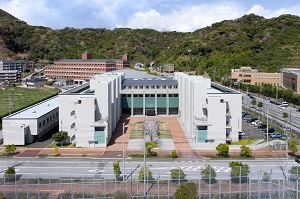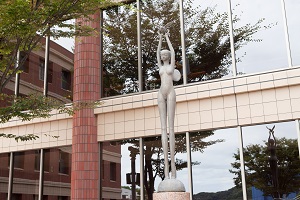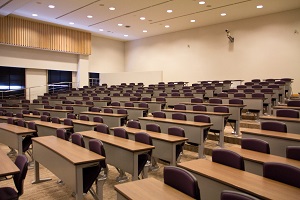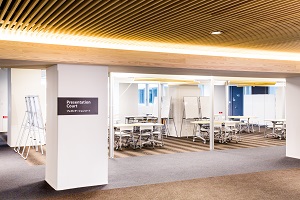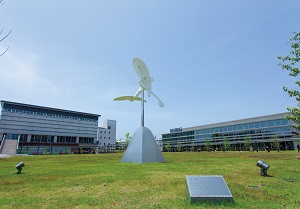本文
Faculty of Cultural Studies Policy
Type of Student We Are Looking For
- People who are able to take the initiative to learn and act proactively toward a goal
- People who have a well-rounded character and respect for others, and who strive to learn together
- People who aim to utilize what they learn at the University of Kochi and contribute to the local and international communities
Admission Policy
The Faculty of Cultural Studies deepens students’ understanding of humans and society through multifaceted cultural research in the humanities and social sciences, developing a well-rounded character and the ability to act proactively through the critical succession of culture, and to contribute to the creation and improvement of local culture, while at the same time developing citizens who are able to contribute internationally to the achievement of a truly abundant and cohesive society.
Accordingly, the Faculty of Cultural Studies seeks the following types of students.
- People who have the basic qualities needed to understand the humanities and social sciences, i.e., sufficient basic academic abilities related to the main subjects studied in high school (Knowledge/Understanding)
- People who have the ability to think and judge things logically based on a broad range of the basic learning gained in high school, and the ability to express those thoughts appropriately in language (Thought/Judgment/Expression)
- People who have a broad interest in humanity and society, and want to gain specialized knowledge in the humanities and social sciences from the perspective of language, region, tourism, and law, etc. (Interest/Motivation/Attitude)
- People who want to deepen their understanding of humanity, develop practical communication skills, and have the desire to obtain the learning needed to proactively discover, analyze, and solve the various issues of contemporary society (Interest/Motivation/Attitude)
- People who want to engage in activities to achieve an abundant and cohesive society in the future, in a broad range of fields in the local and international communities (Interest/Motivation/Attitude)
Curriculum Policy
In order for the students to achieve the Diploma Policy, the Faculty of Cultural Studies has established General Education courses and Departmental courses.
1. General Education courses
(1) In order for the students to acquire what is needed to function within a society that is fair to all, we have sets of courses through which they learn communication skills (i.e. Literacy courses), foundational knowledge of various areas of study (i.e. Foundational courses) and issues concerning local communities as well as international society (i.e. Theme-based Education courses), knowledge and skills for maintenance and promotion of lifelong health (i.e. Health and Sports courses), and practical initiatives to deal with issues centering around local communities (i.e. University-Community Partnership courses).
(2) English Communication courses are mandatory in years 1 and 2. As for the University-Community Partnership courses, the foundational courses are mandatory; the applied courses are elective. Other courses are chosen based on one’s own interests.
(3) Classes are, as much as possible, kept to small numbers, and methods of Active Learning are employed. Classes run in diverse styles based on the content and specific characteristics of each course. Meticulous evaluation of study is also carried out.
2. Departmental courses
The Departmental courses are composed of Common courses and Specialized courses.
(Curriculum structure and educational content)
(1) The Common Departmental courses are made up of the Literacy courses for the students to gain fundamental skills and communication skills for learning in the department; the Essential courses for them to gain knowledge fundamental to the Department's education; and the Career Development courses for them to improve their employability.
(2) In order for the students to extensively and systematically learn the specialized knowledge of humanities and social sciences, we have three major areas of study: Language and Culture (English Studies, International Culture; Japanese Studies, Japanese Literature), Communal Culture Creation (Communal Culture, Community Planning; Tourism and Culture, Tourism and Town Planning; Current Law in Culture, Life and Law in Culture) and Comprehensive Cultural Studies (to learn the contents of Language and Culture courses and Communal Culture Creation courses from a comprehensive perspective).
(3) In order for the students to learn specialized research methods and deepen specialized knowledge and understanding, we provide special seminars in each area of study. We also provide research seminars to develop the students’ ability to make comprehensive, active use of knowledge, skills, behaviors that they have acquired through department education, to discover various problems within current society actively and autonomously, and to solve them through the collection, appropriate organization and analysis of information.
(4) We also provide teacher-training curricula for Junior and Senior High School (Japanese/English).
(Sequence for course registration)
Common Departmental courses are mostly taken in years 1 and 2. Specialized Departmental courses are mostly taken from years 2 through 4. Specialized Seminars in each area of study, and Research Seminars are taken in years 3 and 4.
(Methods of instruction)
Within the Common Departmental courses and Specialized Departmental courses are a variety of teaching methods to help the students pursue their learning actively. Foundation Seminars in the Common Departmental courses, Specialized Seminars in each area of study, and Research Seminars are conducted in a small, seminar-style classroom. Graduation Research as the culmination of department education is completed through Specialized Seminars.
(Evaluation)
The criteria for completing each course are determined on basis of the Department’s Diploma Policy. The methods and standards of the completion criteria and grade evaluation are made explicit to the students and grade evaluation are based thereon. We also strive to guarantee quality education by evaluating and improving the curriculum in light of the students’ evaluation results.
Diploma Policy
The Faculty of Cultural Studies awards bachelor’s degrees to students who have acquired knowledge of humanities and social sciences, and the skills to understand diverse society and culture, to pursue the realization of an affluent and harmonious society, the creation of new culture and pursuit of growth of autonomous self, and who have acquired each of the following abilities.
(Knowledge and understanding)
1. The student has acquired a wide educational base and a fundamental knowledge of humanities and social sciences, and is able to understand diverse cultures from various viewpoints.
2. The student is able to systematically understand specialized knowledge of humanities and social sciences centering around the areas of language and culture as well as the creation of communal culture, and has learned how to place that body of knowledge within his/her own critical mind.
(Ubiquitous and practical skills)
3. The student is able to collect extensive amounts of information necessary to solve problems, and is able to solve those problems through accurate organization and analysis.
(Attitude and orientation)
4. The student is able to take on various regional and international social issues actively and autonomously, working towards the realization of an affluent and harmonious society.
5. The student has a deep interest in society and culture, and is eager to continue learning and thinking throughout his/her life.
(Comprehensive learning experience and ability to think creatively)
6. The student is able to comprehensively put into use the knowledge, skills, attitude, etc. that he/she has learned up to now, and is able to contribute to the creation of new cultures with a free mind. He/she is also able to pursue his/her own individual endeavors, so as to grow as a person.

